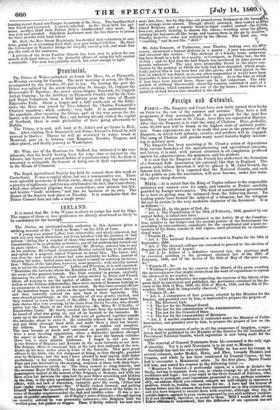IRELAND.
It it stated that Mr. John Wynne is about to resign his seat for Sligo. The names of three or four gentlemen are already mentioned as likely to be candidates for the borough.
The Nation, an unexceptionable authority in this instance gives a striking account of the "Irish in Rome," on the 27th of June. " A young man named Laffan, very respectable, and nicely educated, but with not very much discretion, not being satisfied with the position of ' full private' (being like a number of those who seem to have expected officers' commissions to be as plentiful as berries), put off his uniform and turned out in plain clothes. The officer in command, Mr. Howley, ordered him to put on his uniform. He refused ; Lieutenant Howley ordered him to be arrested, and called on a sergeant named Wiseman to arrest him. The latter, who was close by, and seems to have had some partiality for Laffan, instead of obeying the order, bailed some men at hand to assist in resisting its execu- tion. Others of the battalion, however, most properly, with alacrity turned out to arrest the insubordinates." Laffan and Wiseman, it is said repented. "Meantime the barracks where the Battalion of St. Patrick is stationed was the scene of the greatest tumult. The Irish crowded in groups, excitedly discussing the whole affair, the crowd being swelled by Swiss and French idlers, all waiting to see the upshot of affairs ; and at the cross roads, as well as at the Palazzo Aldobrandint, there were crowds of Romans looking on in amazement at what all the noise was about. By this time several officers of the battalion began to arrive on the spot from various parts of the city, and they instantly ordered the men back to their barracks. The men obeyed grumblingly, as the curiosity of all was greatly excited, and they wanted to learn the result of the affair. By singular and most fortu- nate chance that very evening, by the train from Civita Vecchia, who should arrive but the Major of the Irish Battalion—Mr. Miles W. O'Reilly, of Knockabbey Castle. He barely reached the hotel from the terminus when he heard of what was going On, and off he hurried to the barracks. He came up at the moment while the Irish were all gathered together outside the barracks, about to enter it. He instantly ordered the men to fall in, and put them through their drill, and made them a brief but beauti- ful address. You never saw any change so sudden and complete. The men became as docile and contented as possible, and everything wore a most cheering appearance, when a deplorable incident changed the aspect of affilirs. At the end of the file next the barrack entrance there was a stout athletic Irishman. I forgot to tell you there is one division of Belgians and Romans in the same barracks as our men. The Belgian officer in command had, at the very first outbreak of the row, drawn up his men under arms in front of the barracks. This gave great offence to the Irish, who felt indignant at being, as they thought, guarded over by Belgians, and the man I have alluded to kept saying, with bitter excitement, to his comrade, 'Look at these fellows ; they would sell the Pope and join Garibaldi in the morning, andj look at them with their bayo- nets like sentries to terrify us.' The thing seemed to sting bitterly, and the moment Major O'Reilly gave the order to right about face, this private passionately dashed at the nearest of the Belgians or Romans, and with one blow of his fist between the eyes laid the poor fellow sprawling and kicking in the dust, to the utter amazement and horror of every one. The Belgian officer, with sad lack of discretion, instantly gave the words, ' Prime and load—make ready—present—fire.' O'Reilly rushed forward, and putting himself between the muzzles of the guns and the position of the Irish, in a voice of thunder countermanded the rash and terrible order. It was a mo- ment of painful excitement. At O'Reilly's voice of thunder—though having leo recently arrived he was personally unknown—the:.Belgiane held the 'evelled guns, but pulled no trigger. Then O'Reilly ordered his mentmee more into line ; but by this time out poured every Irishman in the barra and a strange scene ensued. Though utterly unarmed, they rushed atk the armed Belgians, and a regular hand-to-hand conflict ensued—the Iifish, however, merely desiring to disarm the others—wresting away the efuns, twisting bayonets off like twigs, and tossing them in the air by dozeims." Finally, however, order was restored by the officers. The Irish are, very ""exacting," and do not like " drill."
Mr. John Tennant, of Parkstown„ near Thurles, looking over his lifox- covers, discovered a human skeleton in a quarry. A jury was summoned:, and returned this verdict. " The skeleton of a female, name unknowns. has been found in a hole in a quarry, at Carrigeen, on Friday last, the 6th of July ; and we find that the said female was murdered by some person or persons unknown." The jury were irresistibly forced to the above con- clusion by the position in which the body had been deposited, which mani- festly proved that it had been first cut into pieces, and then placed in the i hole in which it was found, as on any other supposition it would have been impossible to force it into so circumscribed a space. As to the time at which it may have been placed there, there can be but conjecture. The only portion of clothing discoverable about the remains consisted of part of a cotton stocking, which remained on one of the leg bones ; there was also a quantity of dark brown hair attached to the skull.


























 Previous page
Previous page